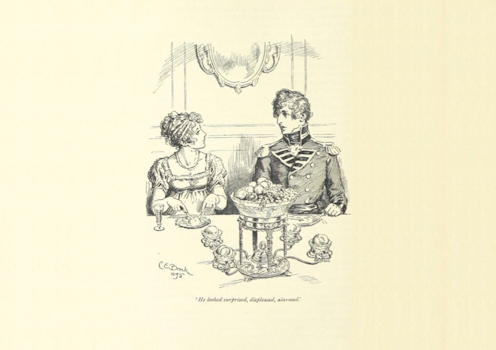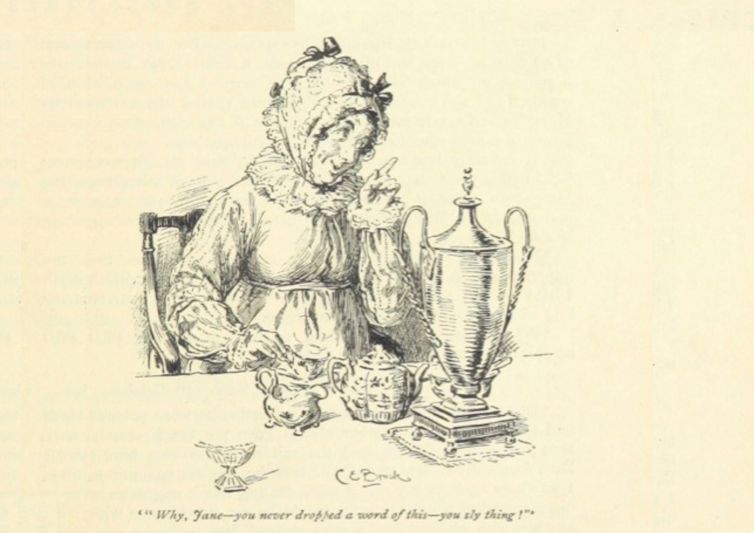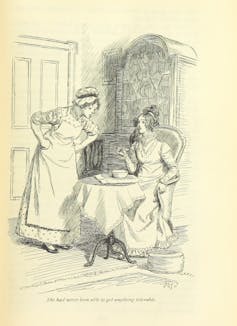
Jane Austen’s works are globally renowned, but they were unknown in China until 1935 when two different translations of Pride and Prejudice were published. Today, her novels are increasingly popular and have been translated into Chinese many times – notably there have been 60 different retranslations of Pride and Prejudice.
Translators face the creative balancing act of remaining faithful to the source text while also ensuring that the translation is a smooth, informative read. One intriguing task for translators of Austen has been how to describe the 19th-century British food featured in the many convivial sequences that shed light on characters through their social interaction.
How do you get an early Chinese reader of Austen’s work in the 1930s to understand what rout-cakes are and why Mrs Elton in Austen’s Emma considers poor versions of these a sign of a bad host? The world was not as globalised as it is now and information not so accessible.
We found this fascinating and so analysed a body of Chinese translations of Austen’s work from 1935 onwards to assess the effectiveness of the translations of food culture during Austen’s era. The results were decidedly mixed.
Elusive equivalents
In Pride and Prejudice, Mrs Bennett contrasts her girls’ upbringing with that of their neighbour, Charlotte Lucas, who assists in cooking “the mince pies”. The notion of a pastry dish containing fruit, meat or vegetables is difficult to convey in Chinese as there are only limited similarities with Chinese “bĭng” which are wheat flour-based items resembling flatbreads, biscuits, or pancakes.
Although early mince pies contained meat, they became sweeter and more fruit-based in the 18th century as sugar imports increased. However, Chinese translators conveyed “mince pies” in different ways, including “steak”, “steamed bun”, and “meat pie”, revealing translation errors or strategies such as the use of Chinese equivalents.
The two wartime translations, made during Japan’s invasion of China from 1937 to 1945 of “mince pie” were “steak” and “steamed bun” but in mitigated circumstance the translators probably had limited access to dictionaries during this period.

Christmas is frequently mentioned in Persuasion. Austen described early 19th-century Christmas meals as occasions when there were “brawn and cold pies, where riotous boys were holding high revel”. Brawn is a cold cut terrine or meat jelly made from a pig’s head and bones, spiced, boiled, then cooled.
Again, through the decades, Chinese translators struggled to convey this notion. One took the catch-all option of “a variety of Christmas cakes and other food”, others fell short with “pork”/“salted pork”, while one unfortunate translated it as “the colour brown”.
China’s increasing familiarity with western food over the years has encouraged more globalised approaches to food translation.
Cakes exemplify this point, being referenced in Emma with regard to Mr Woodhouse whose “own stomach could bear nothing rich”. However, China’s distinctive varieties of cake are markedly different, ranging from “yuè bĭng” (“mooncakes” - pastry cakes with fillings such as lotus seed paste) to “xĭ bĭng” (“happiness pancakes”). The latter was used as a domesticated translation to render Austen’s references to wedding cakes into Chinese.
“Happiness pancakes” are small, round, and made of flour, sesame seed and white sugar. They display a motif signifying happiness and are decorated with red silk. They have been a wedding delicacy for 2,000 years, whereas western-style wedding cakes are relatively new to China. Nevertheless, the newly coined, cosmopolitan concept of “jiéhūn dàngāo” (“wedding cake”) has materialised in recent translations.
Different diets
The diets of British and Chinese people are differentiated by foods such as cheese. Austen periodically mentions cheese, for example in Emma when Mr Elton describes a party with “the Stilton cheese, the north Wiltshire, the butter, the celery, the beet-root and all the dessert”. Such references are problematic for Chinese translators because of cultural differences.

Whereas Britain produces 700 varieties of cheese, the product is less widespread in China due to lactose intolerance. Here, loss of meaning and misinterpretation undermined the translators’ work. Stilton was referred to as a “county” in some translations.
Although several translators attempted to evoke Stilton’s characteristics (such as its “dry” texture) and used transliteration to convey something of original place names (“North Wiltshire” becoming “North Wēněrtè”, for example), most Chinese readers would have been none the wiser compared with a British reader’s understanding of the original text.
While translators deserve credit for giving Chinese readerships a glimpse into Britain’s former socio-cultural mores, their strategies sometimes failed to connect food culture in Austen’s era to contemporary Chinese culture. Although Chinese translators worked during challenging socio-political times, the future of translation – and of mutual understanding in all fields – lies in cross-cultural partnerships between individuals.
In an epoch that is again tending towards global geopolitical isolationism, it is to be hoped that cultural collaboration will remain an important channel of transnational cooperation.
saihong.li@stir.ac.uk is a council member of CIOL (Chartered Institute of Linguists).
William Hope does not work for, consult, own shares in or receive funding from any company or organisation that would benefit from this article, and has disclosed no relevant affiliations beyond their academic appointment.
This article was originally published on The Conversation. Read the original article.







